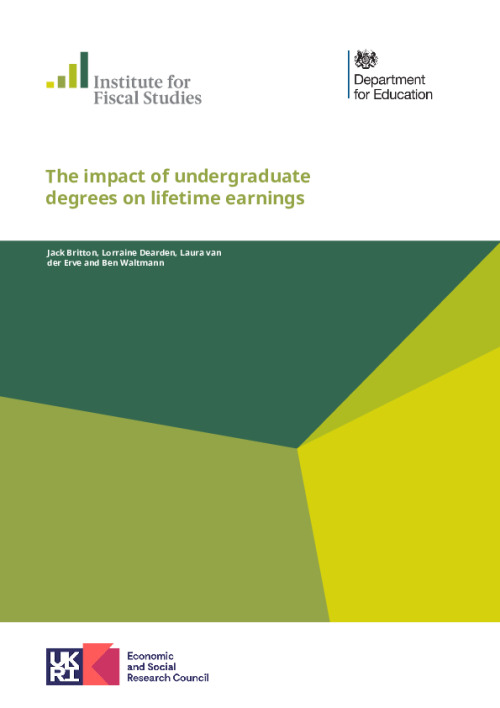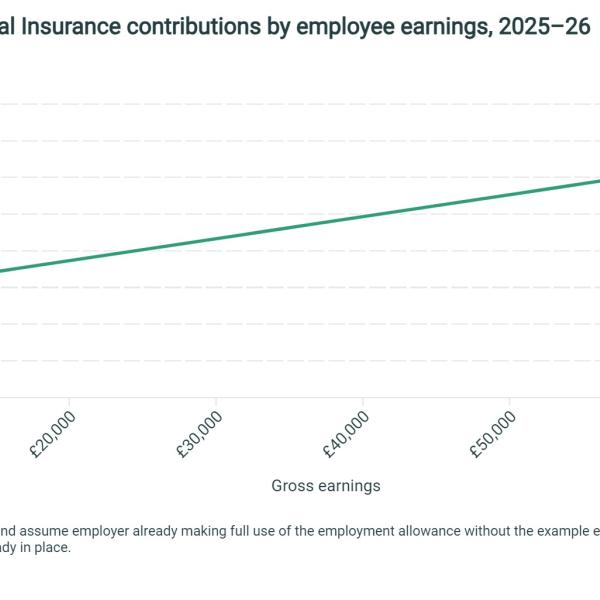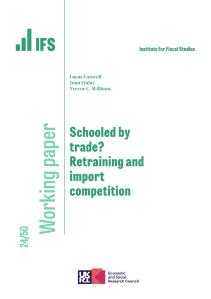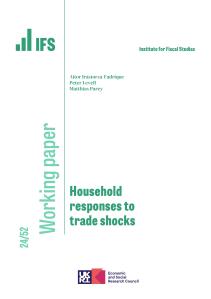Is university a good investment?
Going to university is a very good investment for most students. Over their working lives, men will be £130,000 better off on average by going to university after taxes, student loan repayments and foregone earnings are taken into account. For women, this figure is £100,000. (These and other numbers are in “discounted present value” terms, which means counting earnings later in life less than those earned earlier on. Without discounting, returns look much bigger.)
However, these average returns mask large differences across individuals. So while about 80% of students are likely to gain financially from attending university, we estimate that one in five students – or about 70,000 every year - would actually have been better off financially had they not gone to university.
At the other end of the spectrum, the 10% of graduates with the highest returns will on average gain around half a million pounds in discounted present value terms. Much of this variation is explained by the subject studied at university: students of medicine and law, for example, achieve very high returns on average, while few of those studying creative arts will gain financially from their degrees at all.
Our new research
These are among the findings of new work at the Institute for Fiscal Studies (IFS) commissioned by the Department for Education that investigates the lifetime returns to undergraduate degrees using the Longitudinal Education Outcomes (LEO) dataset. We control for students’ prior attainment and family background to estimate the causal effect of going to university on earnings and employment.
This report expands on previous IFS analysis using the LEO dataset. While our previous work looked at the impact of undergraduate degrees on earnings at age 29, this work also uses newly available university records of earlier cohorts and their earnings records up to age 40. Combined with data from the Labour Force Survey, this allows us to assess the impact on earnings over the whole life cycle.
We then look at how much students pay in taxes and towards their student loans over their whole careers in order to get at the lifetime net financial benefit to the individual. We also calculate the benefit of degrees to the taxpayer, taking into account the government cost of providing student loans, as well as any changes in tax payments.
This study only looks at financial returns. Other personal and social benefits may be as or more important. We also only consider the effect of each student’s choices on their own earnings holding constant the choices of others, limiting the scope for using these results to predict the effects of major changes to the higher education system.
Key findings:
- Median earnings of male graduates grow strongly throughout their 30s, and this earnings growth far outstrips that of non-graduates. For male graduates who were 30 in 2016, we predict earnings to rise by £15k from age 30 to age 40, compared with a rise of just £5k in the median earnings of non-graduate men. The gap in median earnings between graduate and non-graduate men continues to grow strongly until individuals' mid-40s.
- Median earnings growth for female graduates in their 30s is moderate, but still higher than that of non-graduates. We predict median real earnings of female graduates who were 30 in 2016 to rise by around £5k from age 30 to age 40, compared with no growth for non-graduate women. Among degree subjects, law and medicine stand out in that their female graduates do see large growth in median earnings between ages 35 and 40.
- Accordingly, the causal effect of undergraduate degrees on earnings grows after age 30 for both men and women, but much more strongly for men. Average pre-tax returns for men at a given age increase from around 5% on average at age 30 to more than 30% on average at age 40, after which they increase more slowly to reach around 35% from age 50. For women, average pre-tax returns increase from around 25% at age 30 to more than 40% at age 40, but then fall again to between 30% and 35% at ages 50 and 60.
- The average lifetime earnings gain from undergraduate degrees is substantial for both men and women, but much smaller than the difference between the gross earnings of graduates and non-graduates. The discounted difference in lifetime earnings between graduates and non-graduates is £430k for men and £260k for women. Once we account for differences in characteristics between those who do and do not attend HE, we obtain a discounted lifetime increase in gross earnings of £240k for men and £ 140k for women as a result of attending HE.
- The average gain in net lifetime earnings is even smaller due to the progressivity of the tax system. Once taxes and student loans have been taken into account, the earnings premium declines to around £130k for men and £100k for women (£350k and £230k with no discounting). In percentage terms, this represents a gain in average net lifetime earnings of around 20% for both men and women.
- The subject studied at university is hugely important. Net discounted lifetime returns for women are close to zero on average for creative arts and languages graduates, but more than £250k for law, economics or medicine. Men studying creative arts have negative financial returns, while men studying medicine or economics have average returns of more than half a million pounds.
- However, studying a subject with high average returns is no guarantee of high returns. While average returns to law and economics are high, many students will see much lower benefits from studying those subjects, and a few will see much higher returns. In contrast, subjects such as education and nursing do not have very high returns on average, but women who study these subjects almost universally achieve positive returns.
- Overall, we expect 85% of women and around three-quarters of men to achieve positive net lifetime returns. This means that around one in five undergraduates would have been better off financially had they not gone to university. At the other end of the spectrum, the 10% of graduates with the highest returns will on average gain more than half a million pounds in discounted present value terms.
- Financing undergraduate degrees is expensive for the taxpayer, but on average increased tax revenues more than make up for it. Overall, we estimate that the expected gain to the exchequer of an individual enrolling in an undergraduate course is around £110k per student for men and £30k per student for women.
- However, these gains are driven mainly by the highest-earning graduates. We expect the exchequer to gain more than half a million pounds on average from the 10% of graduates with the highest exchequer returns, but to make a loss on the degrees of around 40% of men and half of women. This means that nearly half of all students receive a net government subsidy for their degrees, even after tax and National Insurance payments have been taken into account.














